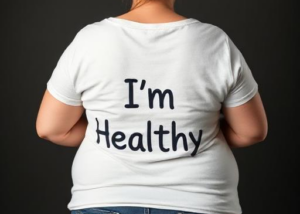Here are 12 facts you should know about your body fat.
These facts are particularly important to those with obesity, especially morbid.
No matter how “positive” you may feel about your “today” body, this will not change the effects of excess weight on one’s health and mobility.
1 The Number of Fat Cells in Adulthood Will Never Decrease
On average the human body has 10 to 30 billion fat cells.
The number can rise or lower in childhood, but once we reach adulthood, that number becomes the minimal number you’ll ever have.
2 We Can Get More Fat Cells As Adults
A little weight gain doesn’t always mean more fat cells; only bigger fat cells.
However, if you gain a LOT of weight, you WILL acquire more fat cells!
Obesity can mean up to 100 billion fat cells.
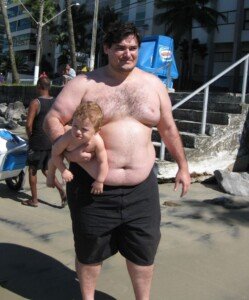
Paulo de Tarso Meneghel, CreativeCommons
Weight loss in these cases results when the amount of fat in the cells is reduced through diet and exercise, shrinking their size.
3 Three Types of Body Fat
The first type is brown fat. It stores calories and burns energy.
The second type is just below the skin, called subcutaneous fat.
It’s harmless in that it has no direct negative impact on cardiovascular health or glucose metabolism.
However, enough subcutaneous fat can literally weigh down on the knees, leading to joint degeneration.
Enough subcutaneous fat will also impair mobility and can lead to shortness of breath and low back pain, not to mention put a 24/7 mechanical strain on the heart.
“Many hearts can’t cope with this, so something has to give.
“The person might develop chest pain or undue breathlessness, or they may be unable to do the exercise.”
The third type is visceral fat, which surrounds organs. Often called “internal fat,” it’s significantly linked to a higher risk of disease including that affecting the heart.
“Changes to walls of the arteries occur with atherosclerosis,” says Dr. Beatty.
“These include deposition of lipids (fats) in the arterial wall, causing narrowing of the arteries.
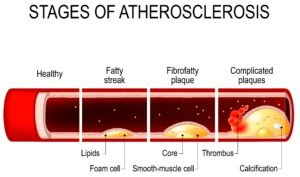
Shutterstock/Designua
“If the artery is significantly narrowed, less blood gets through to the organ it is supplying.
“If this is a coronary artery, then reduced blood means less oxygen getting to heart muscle.
“Inadequate blood to the heart muscle will cause pain, in this case angina.”
Atherosclerosis in the heart very often causes death. Excess fat in the body — obesity — dramatically increases the likelihood of developing atherosclerosis.
4 We All Need Fat
Fat serves several vital purposes such as keeping the body warm.
But too much fat means danger to the body — no matter how much “fat liberation” content you read on Instagram.
“Blood pressure goes up in proportion to excess body fat,” says Dr. Beatty.
“Weight loss of one kg. — about two lbs. — results in a drop of BP of 1-2 mmhg.
“People with high blood pressure are 2-3 times more likely to have atherosclerosis.” Hypertension can also cause a stroke.
“The risk of diabetes increases with excess body fat. Diabetics are also 2-3 times more likely to have atherosclerosis.
“Cholesterol, especially the bad cholesterol — LDL — goes up with obesity.”
5 Body Fat Percentage vs. BMI
Body fat percentage can be deceivingly high in “skinny fat” people and deceivingly low in “thick” people who train hard and heavy with weights.
Check out the chart below, according to the American Council on Exercise.
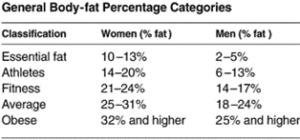
A personal trainer can calculate your body fat percentage with skin-fold calipers.
BMI can be deceiving, since bodybuilders and other athletes can have BMIs equal to that of same-height, same-age overweight people. See the depiction below.
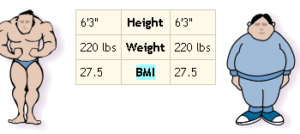
However, BMI is used by doctors because the calculation (weight in kilograms divided by height in meters squared) can be done in a second by feeding the information into a computer.
Studies that link a slightly high BMI with a health benefit do NOT take into consideration the body composition of the study subjects.
6 No Choosing, Do BOTH
To burn fat you’ll get best results with both aerobic and strength training workouts.
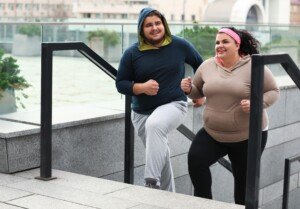
Shutterstock/New Africa
Hours and hours on cardio machines or walks in the park but still carrying a lot of belly blubber? Start picking up heavy things!
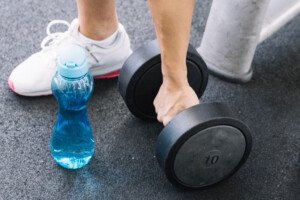
Freepik.com
7 Fat Gain with Age
Though as we age, we have to work harder to keep off excess weight, this doesn’t mean we have to settle for this excess weight.
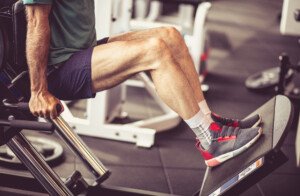
Shutterstock/Mladen Zivkovic
Just because you were able to “eat everything in sight” in your 20s and now are on the hefty side doesn’t mean you can’t reverse this situation with the right approach to diet, aerobic exercise and strength training.
8 Fatty Foods
Eating a lot of nuts and fatty fish has never made a person obese.
Some foods contain “good” fats including olive oil, almonds and seeds.
Though certain diets can expedite weight loss, you will still lose weight by reducing the size of your typical portions.
Good fats are mono-, poly- and unsaturated, and bad fats are saturated and trans- types.
9 Cellulite
Leaner women can get this, which is subcutaneous fat that doesn’t deposit in the most aesthetically pleasing way.

Shutterstock/Sorn340 Images
If you hate your cellulite, you may want to take up intense lower body strength training and see what happens after six months.
10 Crunches and Sit-ups
Oh give it up already if the only reason you do these is to reduce the fat in your middle.
The muscles these target are not big enough to yield a fat-scorching effect throughout the entire body OR locally.
To shear off fat in the belly and legs you must combine proper diet with an overall strength training regimen that focuses on large muscle groups.

Freepik.com/pressfoto
Intense workouts (don’t forget aerobics) will cause energy deficits, leading to the mobilization of fat cells to burn energy for recovery from the workouts! In short: faster resting metabolism.
11 Those Larger-than-Life Instagram Influencers
Don’t let the bombardment of very big Instagram influencers in seductive poses trick you into believing that your heart and blood vessels won’t mind a lot of excess body fat.

Roberto Hund, Pexels
They can come up with all the most philosophical statements in the world, but FACTS ARE FACTS.
Some morbidly obese women have reeled in so many gullible, disenchanted followers under their spell that companies have generously paid them to advertise their products in their postings: the monetization of morbid obesity!
Just because some women have made money off of their obesity doesn’t make it any less hazardous to their health.
12 Youth Is an Amazing Protector
Some women and men who are at least 100 pounds overweight seem to move around quite well.
It’s no coincidence that usually they’re in their 20s and 30s.
One cannot age gracefully with obesity.


 Dr. Beatty has worked in primary medicine, surgery, accident and emergency, OBGYN, pediatrics and chronic disease management. He is the Doctor of Medicine for
Dr. Beatty has worked in primary medicine, surgery, accident and emergency, OBGYN, pediatrics and chronic disease management. He is the Doctor of Medicine for 